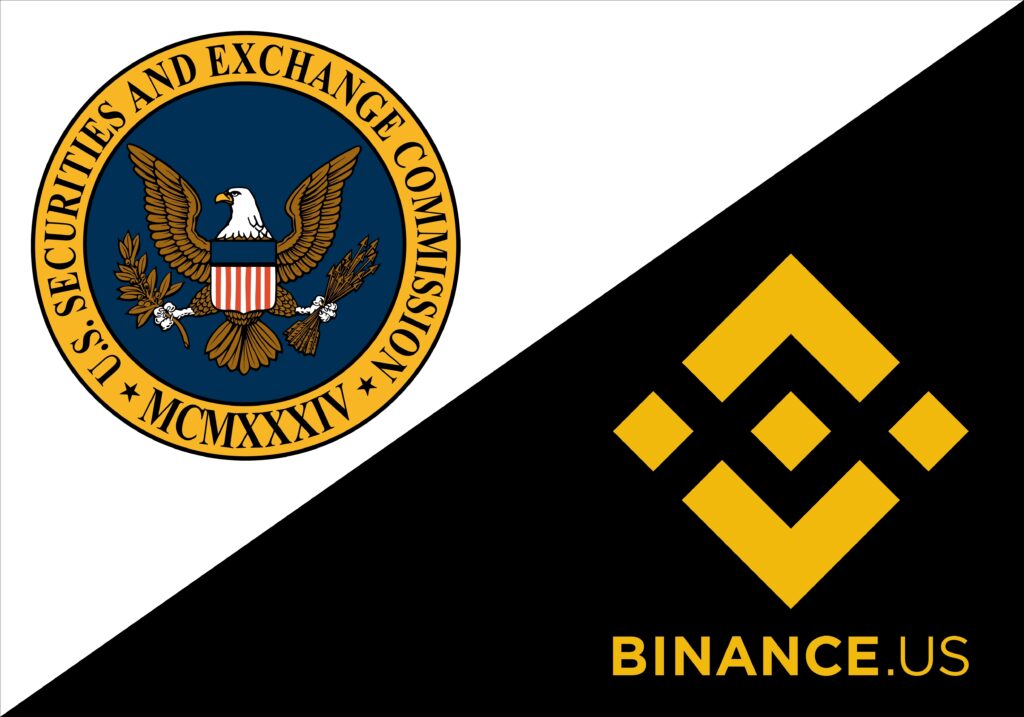SEC Vs Crypto? Regulations and Controversies
The Securities and Exchange Commission (SEC) has long been a central figure in the regulatory tussle with various crypto platforms. However, the recent surge in lawsuits against exchanges has taken the conflict to a new level of intensity.
Each lawsuit has its intricacies, yet a common thread runs through them all – allegations of security offerings without the necessary SEC registration, signaling the SEC’s determination to extend its regulatory reach into the crypto space.
As the year unfolded, the SEC’s legal barrage began with suits against Bittrex and Kraken. Following that, in July, the regulatory body set its sights on Celsius Network Limited and Angela Elbanna and his multiple digital asset platforms.
However, it was the high-profile cases against crypto giants Binance and Coinbase in June that caught the most attention. Today, we’ll discuss the lawsuits against Binance and Coinbase in-depth, touch on Ripple’s partial win against the SEC, and what it all means for the future of crypto in the US.
SEC Sues Binance

On June 5th, 2023, the SEC dropped a legal bombshell by filing 13 charges against Binance Holdings Ltd., its U.S.-based affiliate BAM Trading Services Inc., and its founder Changpeng Zhao, widely known as CZ.
The crypto space is no stranger to regulatory challenges, but when the U.S. The Securities and Exchange Commission (SEC) sets its sights on a major player like Binance, the ripples across the industry are hard to ignore.
The Allegations
The SEC’s allegations are nothing short of comprehensive, painting a complex picture of alleged wrongdoings involving Binance and its key figures. Here are the main allegations in a nutshell –
Providing Unlawful Trading Access to US Investors: The SEC claims that despite Binance’s public stance on restricting U.S. customers from its primary platform, CZ and the exchange allowed high-net-worth US investors to stealthy trade on their unregulated international exchange. According to the SEC, this strategic subversion of control allegedly took various forms, including the promotion of evasion plans encouraging users to bypass KYC procedures via VPNs.
If you don’t already know, Binance.US is a separate platform from Binance.com. It caters specifically to US users and adheres to local regulations.
Moreover, according to two former unnamed Binance CEOs, the SEC further alleges that CZ had significant involvement in Binance.US operations, contradicting his claims.
Commingling Investor Funds: The SEC further alleges that CZ and Binance could commingle customer assets and divert them, including directing funds to entities beneficially owned by CZ himself. These entities, known as Sigma Chain and Merit Peak, reportedly acted as “market makers” for Binance.US, raising concerns of conflicts of interest and manipulation. These allegations are similar to what Sam Bankman-Fried is facing due to the FTX scandal.
Securities Laws Violations: The SEC contends that Binance.US operated as an unlicensed securities exchange and broker firm. It deems certain crypto assets and services offered by the platform, including BNB (Binance’s exchange token) and BUSD (its stablecoin), as securities or securities-related functions. This led to assertions that these offerings should fall under the regulatory umbrella of the SEC.
Binance’s Response and Ongoing Battle
In an immediate response to the allegations, CZ took to Twitter to dismiss the claims as an attempt to sow fear, uncertainty, and doubt in the crypto market.
Binance followed up with an official blog post, expressing disappointment at the SEC’s choice to file a complaint instead of engaging in a collaborative effort, adding, “But despite our efforts, with its complaint today the SEC abandoned that process and instead chose to act unilaterally and litigate. We are disheartened by that choice” and “All user assets on Binance and Binance affiliate platforms, including Binance.US, are safe and secure, and we will vigorously defend against any allegations to the contrary.”
The case is still ongoing, and most recently, Binance’s legal team filed for a protective order against the SEC, contesting the regulator’s requests for information as “overly broad” and “unduly burdensome.”
The outcome of these legal proceedings will likely reverberate far beyond Binance, potentially influencing how other major players in the crypto space engage with regulators.
SEC Sues Coinbase
The SEC’s complaint against Coinbase came on June 6, a day after its lawsuit against Binance. While not as sprawling as the charges brought against Binance, Coinbase’s legal battle is equally significant.
The Allegations
Unlike Binance, whose legal battle encompasses a range of allegations, Coinbase’s battle with the SEC revolved around a more focused area: allegations of functioning as a national securities exchange without obtaining the necessary registration from the SEC.
The SEC contends that Coinbase facilitated trading for 13 cryptocurrencies qualified as crypto asset securities. Additionally, it raised concerns over the platform’s staking-as-a-service program, which it viewed as another form of unregistered securities offering.
The crux of the matter revolved around whether certain crypto assets and services offered by Coinbase could be classified as securities, thus falling under the regulatory jurisdiction of the SEC.
Coinbase’s Response and Ongoing Legal Battle
In response to the lawsuit, Brian Armstrong, co-founder of Coinbase, took to Twitter, stating, “Regarding the SEC complaint against us today, we’re proud to represent the industry in court to finally get some clarity around crypto rules.”
Brain also pointed out why this legal battle is fundamentally different than what Binance is facing, as the complaint against Coinbase is “exclusively focused on what is or is not a security.”
As of the latest update, Coinbase requested a federal judge to dismiss the case against them. Their defense hinges on the simple argument that the crypto assets and services it provides do not meet the criteria to be classified as securities, and therefore, the SEC is reaching beyond its jurisdiction by taking legal action against the company.
Ripple’s Partial Win Against SEC

Amid the turbulence of ongoing crypto legal battles, one case stood out as a significant milestone – the legal clash between the U.S. Securities and Exchange Commission (SEC) and Ripple.
The SEC’s lawsuit against Ripple, filed in December 2020, mirrored a familiar narrative: Are cryptocurrencies securities? The regulatory body accused Ripple of conducting unregistered securities sales by selling XRP tokens. This legal tussle lasted over two years, finally reaching its conclusion on July 13, 2023, with Ripple securing a partial victory and setting a significant precedent.
The District Court for the Southern District of New York stated in its ruling that the “offer and sale of XRP on digital asset exchanges did not amount to offers and sales of investment contracts.” However, it noted that Ripple’s institutional sales of XRP did constitute the unregistered offer and sale of investment contracts, which violated Section 5 of the Securities Act.
Ripple’s partial win seems even more significant when viewed against the backdrop of ongoing legal battles involving Binance and Coinbase. The ruling can potentially set a precedent that these entities might leverage in their defense against similar allegations.
Nonetheless, this entire situation reflects the evolving nature of the crypto landscape and the need for more precise regulatory definitions.
The Repercussions
Both Binance and Coinbase experienced substantial drops in their respective share prices immediately after the lawsuit.
Moreover, Binance’s native token, BNB, took a sharp hit, plummeting by 12% after receiving a staggering $778.6 million worth of withdrawal requests by users following the lawsuit. Coinbase was relatively less affected but still suffered $57.7 million in withdrawals.
The second-order consequences were felt across the broader crypto market. While Bitcoin experienced a relatively modest 6-7% price drop within 24 hours, tokens targeted by the regulatory body for potential classification as securities, such as Solana, Cardano, Filecoin, and Polygon, experienced price plunges ranging from 6% to 13%.
Although Bitcoin has recovered since then, trading at $26,000 as of the latest update, the other affected tokens are still recovering. Overall, the negative impact on crypto prices was only short-lived.
Is the Future of Crypto in Danger?
It’s no secret that from its inception, regulatory bodies around the world have viewed the crypto industry with skepticism and intrigue.
While many crypto advocates view strict regulatory enforcement as a potential hindrance to the growth and potential of the industry, regulators are tasked with protecting investors and maintaining the integrity of financial systems, leading to constant friction between the two parties.
The current SEC Chair, Gary Gensler, doesn’t shy away from expressing his skepticism towards the crypto industry, reflected in his recent statement – “We don’t need more digital currency…we already have digital currency – it’s called the US dollar.”
However, with the recent Ripple court ruling, the ongoing Binance and Coinbase lawsuits, and the potential Crypto Oversight Bill, which recently passed a congressional committee and aims to address the roles and authority of both the SEC and the CFTC in overseeing cryptocurrencies, we can expect more clarity needed to establish a proper regulatory framework for crypto.